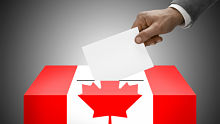
Canadians could experience substantial changes to certain family and children benefits, depending on which political party wins the federal election on Oct. 19.
The most contentious of the benefits that could change is the Family Tax Cut, which was introduced by the Conservative government and became effective in the 2014 taxation year. A federal tax credit, this benefit allows higher-income spouses with children under 18 to transfer up to $50,000 of taxable income to spouses in a lower tax bracket, with the tax relief for the family capped at $2,000.
When this benefit was announced, the Conservative government noted that seniors were making use of income splitting, “which is why the government is now proposing similar relief for families.”
However, Andrew Thomson, New Democratic Party (NDP) candidate for the Eglinton — Lawrence riding in Toronto says, “The NDP will reverse the Conservative’s income-splitting scheme.” Specifically, he contends that “the scheme costs $2 billion annually and, according to the Parliamentary Budget Officer, provides no benefit to 85% of Canadian families.”
The NDP’s priority is to reinvest funding derived from repealing the Family Tax Cut into programs that have a broader general benefit to Canadian families, including strengthening labour force participation through its plan to create a million subsidized childcare spaces, Thomson says.
In addition, the NDP also supports programs to “further reduce non-routine costs for Canadian families through initiatives like the introduction of a new pharmacare initiative that leverages a national formulary framework and bulk buying, which will free-up a substantial portion of the existing $29 billion in drug costs coming out of Canadians’ discretionary household budgets.”
A Liberal government will also repeal income-splitting for families “to fund a new Canada Child Benefit (CCB) that will lift 315,000 children out of poverty and provide more generous benefits to 9 out of 10 families, only excluding the very wealthiest Canadians,” says Jean-Luc Ferland, a media relations spokesman with the Liberal Party of Canada in Ottawa.
Most of the benefits of the Family Tax Cut “go to wealthy families [and] wouldn’t do anything for all single parents and very low-income families,” he says, “and will also discourage second-earners — most often women — from entering the work force.”
Another benefit that could change following the election is the Universal Child Care Benefit (UCCB). The Conservatives increased the UCCB to $160 a month from $100 for children under the age six and also added a new monthly benefit of $60 for children between the ages of 6 and 17, effective Jan. 1, 2015.
Dollar limits for the Child Care Expenses Deduction have also been increased by $1,000 for the 2015 tax year. The maximum amounts that can be claimed will increase to $8,000 from $7,000 for children under age seven, to $5,000 from $4,000 for children aged seven through 16, and to $11,000 from $10,000 for children who are eligible for the Disability Tax Credit.
The Liberals plan to overhaul UCCB by introducing a new income-tested, tax-free monthly CCB that would provide payments to all families with children who have an annual income of less than $150,000. “Instead of sending government cheques to millionaires, a Liberal government will use that money to reduce poverty,” Ferland contends.
On the other hand, the NDP will protect the benefits received under the UCCB, says Thomson, noting that the party has plans to ensure that Canadian families get the affordable quality childcare they deserve. This means making quality daycare spaces available where parents won’t pay more than $15 a day.
In doing so, the NDP will work with the provinces to put a delivery mechanism in place and build “service capacity by ensuring a predictable revenue stream, regardless of whether the spaces are delivered via private, [non-governmental organizations], co-op, or public channels,” Thomson contends.
Meanwhile, the Conservatives did not answer repeated requests for comments. However, in terms of family friendly promises, they have announced plans to double the federal grant provided to low- and middle-income families for the registered education savings plans. This will provide as much as $2,200 more per student in matching government support.
Both the NDP and the Liberals recognize the importance of higher education but do not yet have a plan to support it.
“Liberals know that investing in making post-secondary education more affordable is crucial to Canada’s and Canadians’ economic prosperity,” Ferland says.
“We will be announcing policy to make post-secondary education more accessible to more Canadians,” says Thomson, adding that the NDP plans to introduce “additional measures to support young people in gaining experience through paid internship programs.”